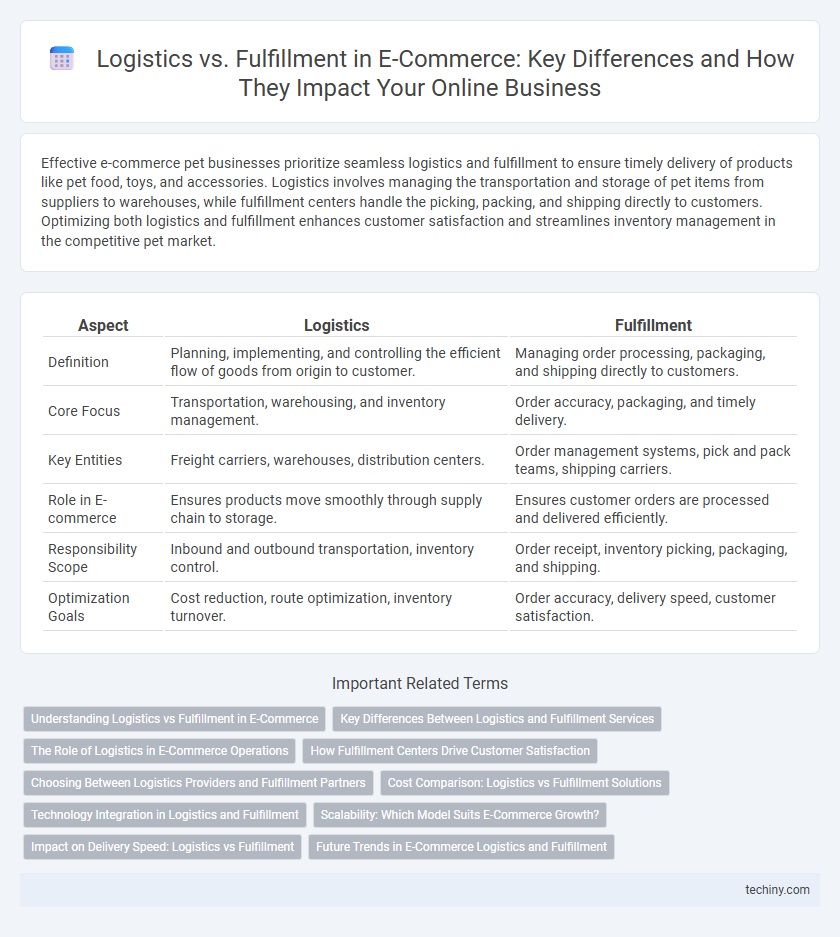Effective e-commerce pet businesses prioritize seamless logistics and fulfillment to ensure timely delivery of products like pet food, toys, and accessories. Logistics involves managing the transportation and storage of pet items from suppliers to warehouses, while fulfillment centers handle the picking, packing, and shipping directly to customers. Optimizing both logistics and fulfillment enhances customer satisfaction and streamlines inventory management in the competitive pet market.
Table of Comparison
| Aspect | Logistics | Fulfillment |
|---|---|---|
| Definition | Planning, implementing, and controlling the efficient flow of goods from origin to customer. | Managing order processing, packaging, and shipping directly to customers. |
| Core Focus | Transportation, warehousing, and inventory management. | Order accuracy, packaging, and timely delivery. |
| Key Entities | Freight carriers, warehouses, distribution centers. | Order management systems, pick and pack teams, shipping carriers. |
| Role in E-commerce | Ensures products move smoothly through supply chain to storage. | Ensures customer orders are processed and delivered efficiently. |
| Responsibility Scope | Inbound and outbound transportation, inventory control. | Order receipt, inventory picking, packaging, and shipping. |
| Optimization Goals | Cost reduction, route optimization, inventory turnover. | Order accuracy, delivery speed, customer satisfaction. |
Understanding Logistics vs Fulfillment in E-Commerce
Logistics in e-commerce encompasses the entire process of planning, implementing, and controlling the efficient movement and storage of goods from the point of origin to the end customer. Fulfillment specifically refers to the steps involved in receiving, processing, packing, and shipping customer orders accurately and promptly. Understanding the distinction between logistics and fulfillment is essential for optimizing supply chain efficiency and enhancing customer satisfaction in e-commerce operations.
Key Differences Between Logistics and Fulfillment Services
Logistics encompasses the overall management of transporting, warehousing, and inventory control, while fulfillment specifically refers to the picking, packing, and shipping of customer orders. Fulfillment services focus on order accuracy and delivery speed to enhance customer satisfaction, whereas logistics aims to optimize supply chain efficiency and cost reduction. Understanding these distinctions helps e-commerce businesses streamline operations and improve end-to-end delivery performance.
The Role of Logistics in E-Commerce Operations
Logistics in e-commerce operations involves the strategic planning and management of inventory storage, transportation, and delivery processes to ensure timely and cost-effective product distribution. Efficient logistics systems enhance order accuracy, reduce shipping delays, and improve customer satisfaction by optimizing supply chain networks and leveraging real-time tracking technologies. The integration of advanced logistics solutions, such as automated warehouses and last-mile delivery innovations, is critical to scaling e-commerce businesses and maintaining competitive advantage.
How Fulfillment Centers Drive Customer Satisfaction
Fulfillment centers enhance customer satisfaction by ensuring accurate order processing, faster shipping, and real-time inventory management, which reduces delivery errors and delays. These centers leverage advanced technologies like automation and data analytics to streamline operations, providing customers with timely updates and reliable service. Efficient fulfillment directly impacts repeat purchases and brand loyalty by meeting or exceeding customer expectations in the e-commerce landscape.
Choosing Between Logistics Providers and Fulfillment Partners
Choosing between logistics providers and fulfillment partners requires evaluating the scope of services each offers in e-commerce supply chain management. Logistics providers primarily focus on transportation, warehousing, and inventory management, while fulfillment partners specialize in order processing, packaging, and last-mile delivery. E-commerce businesses should consider factors such as scalability, integration capabilities with their online platforms, and customer service quality to optimize shipping efficiency and enhance customer satisfaction.
Cost Comparison: Logistics vs Fulfillment Solutions
Comparing cost structures, traditional logistics often incurs higher expenses due to warehousing, transportation, and labor management, whereas fulfillment solutions typically streamline these costs through automation and integrated technology platforms. Fulfillment providers leverage economies of scale, reducing per-order processing fees and minimizing last-mile delivery costs, making them more cost-effective for e-commerce businesses with fluctuating volumes. Businesses seeking to optimize expenses should analyze storage fees, shipping rates, and service flexibility when choosing between in-house logistics and third-party fulfillment services.
Technology Integration in Logistics and Fulfillment
Technology integration in logistics and fulfillment streamlines order processing, inventory management, and delivery tracking through advanced software solutions like Warehouse Management Systems (WMS) and Transportation Management Systems (TMS). Leveraging automation technologies such as robotics, IoT devices, and AI-powered analytics enhances operational efficiency, reduces errors, and accelerates shipping times in e-commerce supply chains. Real-time data synchronization between logistics carriers and fulfillment centers improves transparency, enabling dynamic route optimization and accurate delivery estimates.
Scalability: Which Model Suits E-Commerce Growth?
Scalability in e-commerce logistics depends on efficient inventory management, shipping speed, and cost control, making third-party fulfillment services ideal for rapidly growing businesses seeking flexible expansion without heavy investment in warehousing. Direct logistics models can offer greater control but may struggle with scalability due to fixed infrastructure and resource constraints. Companies aiming for agile growth often benefit from fulfillment centers integrated with advanced technology for real-time tracking and automated order processing.
Impact on Delivery Speed: Logistics vs Fulfillment
Logistics directly affects delivery speed by optimizing transportation routes, inventory management, and warehousing efficiency, ensuring faster order processing and shipment. Fulfillment centers streamline order picking, packing, and shipping, significantly reducing handling time and improving last-mile delivery speed. Efficient integration of logistics and fulfillment processes is crucial for minimizing delivery times and enhancing customer satisfaction in e-commerce.
Future Trends in E-Commerce Logistics and Fulfillment
E-commerce logistics and fulfillment are evolving rapidly with the integration of AI-driven automation, real-time inventory tracking, and drone delivery systems revolutionizing order processing and shipment speed. Emerging trends include the use of blockchain for supply chain transparency, sustainable packaging solutions, and localized micro-fulfillment centers to reduce last-mile delivery times. These innovations collectively optimize operational efficiency, enhance customer experience, and address growing consumer expectations for faster and more eco-friendly delivery options.
Logistics vs Fulfillment Infographic

 techiny.com
techiny.com